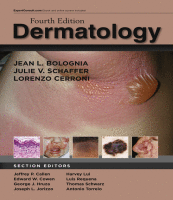Physical Address
304 North Cardinal St.
Dorchester Center, MA 02124

Sweat Glands Eccrine Sweat Glands Key features ▪ 2–5 million eccrine glands are unevenly distributed over the skin surface ▪ In healthy individuals, eccrine sweat is 99% water ▪ Sweating is a reflex sympathetic autonomic function mediated by cholinergic neurons…

Introduction This chapter will review both superficial and deep forms of folliculitis as well as disorders of follicular keratinization and the follicular occlusion tetrad (acne conglobata, hidradenitis suppurativa, dissecting cellulitis, and pilonidal sinus). Examples of superficial folliculitis include those due…

Introduction The term “ rosacea ” encompasses a constellation of clinical findings, with the key components being persistent facial erythema and inflammatory papulopustules. Additional features are facial telangiectasias, a tendency for frequent facial flushing (sometimes referred to as “pre-rosacea”), non-pitting…

Synonym ▪ Acne Key features ▪ A multifactorial disorder of the pilosebaceous unit ▪ Significant psychologic and economic impact ▪ Clinically characterized by comedones, papules, pustules, cysts, and potential scarring Introduction Acne vulgaris is a multifactorial disorder of the pilosebaceous…

Eccrine, Apocrine, and Apoeccrine Sweat Glands Key features ▪ Eccrine sweat glands are activated by emotional and thermal stimuli and are necessary for thermoregulation; they have a generalized distribution, with the highest density on the palms and soles ▪ The…

A wide variety of conditions can cause vesicles, pustules, bullae, erosions, and ulcerations during the newborn period and infancy. Accurate and prompt diagnosis is important because some of the underlying disorders represent potentially life-threatening infections; conversely, many are benign and…

Vesiculobullous diseases of the skin encompass a wide range of entities, including autoimmune bullous diseases and inherited blistering disorders (see 28, 29, 30, 31, 32 ). This chapter focuses on the remaining non-infectious disorders in which cutaneous bullae develop and…

Synonyms ▪ All forms of EB: EB hereditaria ▪ EB simplex: epidermolytic EB ▪ Junctional EB: EB atrophicans, EB letalis ▪ Dystrophic EB: EB dystrophica Key features ▪ Epidermolysis bullosa (EB) encompasses multiple clinically distinctive disorders that share three major…

Key features ▪ Dermatitis herpetiformis (DH) is differentiated from linear IgA bullous dermatosis (LABD) on the basis of granular IgA versus linear IgA deposition at the basement membrane zone, as observed by direct immunofluorescence ▪ DH is a cutaneous manifestation…

Bullous Pemphigoid Synonym ▪ Pemphigoid Key features ▪ Bullous pemphigoid (BP) is the most common autoimmune subepidermal blistering disease, and its onset is often after 60 years of age ▪ It is usually a chronic disease, with spontaneous exacerbations and…